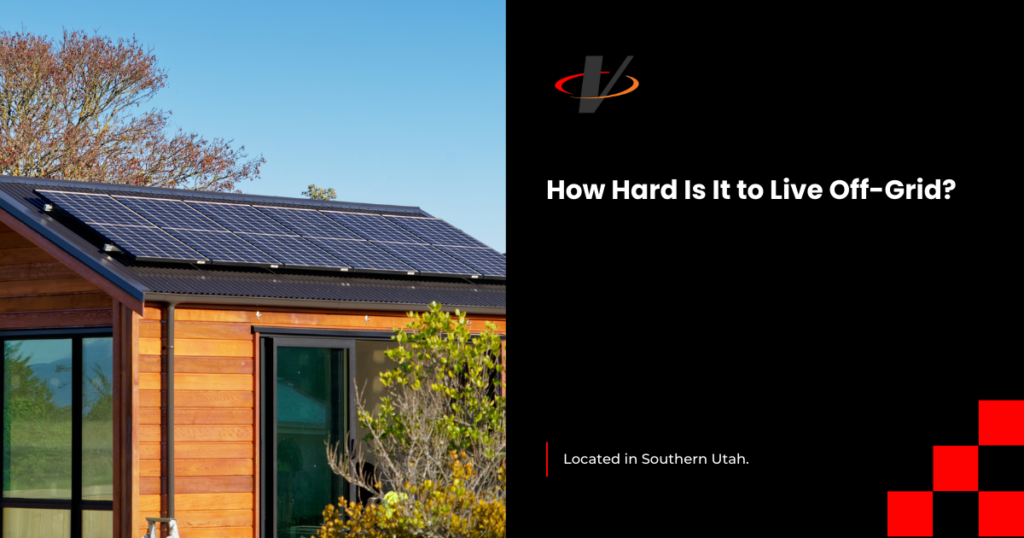
Living off-grid has become a romanticized ideal for many people looking to escape the hustle and bustle of modern life. With the promise of freedom, self-sufficiency, and a closer connection to nature, the idea of going off-grid is alluring. However, the reality is far more challenging than it appears. For those considering making the leap, it’s essential to understand just how hard it is to live off-grid—and why it may not be the utopia many imagine.
The Demands of Self-Sufficiency
One of the most significant challenges of off-grid living is achieving true self-sufficiency. Unlike life in a city or suburban environment, where utilities and services are readily available, living off the grid requires you to produce your own energy, water, food, and waste management.
Power Generation: While solar panels, wind turbines, and other renewable energy sources can power your off-grid home, they come with significant upfront costs, ongoing maintenance, and weather dependency. For instance, solar energy requires a large number of panels and storage batteries to sustain a typical household, particularly during cloudy days or long winters. These systems can fail, leaving you without power for days or even weeks.
Water Supply: Finding a reliable water source is another considerable hurdle. If you’re not connected to municipal water, you’ll need to rely on wells, rainwater harvesting, or nearby natural sources. Maintaining clean, drinkable water can be time-consuming and costly, especially if you need to install filters, purifiers, or pumps. And if your water source dries up in a drought, you’re left without one of life’s essentials.
Food Production: Growing your own food sounds idyllic, but it requires extensive knowledge, effort, and space. Gardening, raising livestock, and hunting can take up much of your time, and if you experience poor weather conditions, pests, or crop failure, your food supply is at risk. You may find yourself having to rely on grocery stores far more than you initially anticipated.
Isolation and Lack of Services
Living off-grid often means living in remote locations, far from the conveniences of urban life. While this isolation might be appealing at first, the lack of nearby services can quickly become a burden.
Emergency Services: In the event of a medical emergency, you may be hours away from the nearest hospital or ambulance service. Living off-grid requires you to be prepared for any number of emergencies, from serious injuries to natural disasters. The isolation can be life-threatening in cases where immediate medical attention is needed.
Supply Runs: Being far from stores also means that even simple errands, like picking up groceries or hardware supplies, can become day-long events. Forgetting a crucial item could mean going without it for days, adding to the stress of daily life. Additionally, without reliable roads, getting in and out of your property during winter or heavy rains can be difficult or impossible.
Financial Costs and Maintenance
Many people assume that living off-grid will save money in the long run. However, the financial realities can be daunting, particularly in the beginning.
Initial Investments: Setting up an off-grid home often requires a large initial investment. You’ll need to purchase land, install energy and water systems, build or retrofit your home for efficiency, and ensure you have all the tools and supplies needed for self-sufficiency. These costs can add up quickly, making off-grid living far more expensive than anticipated.
Ongoing Maintenance: Keeping your systems running smoothly is a constant task. Solar panels need to be cleaned, water systems need to be tested, and your home will require ongoing repairs and upgrades. If you’re not particularly handy or experienced with DIY repairs, you may find yourself frequently hiring outside help, which can negate some of the cost savings of living off-grid.
Legal and Zoning Issues: In some areas, living off-grid can be legally complicated. Zoning laws, building codes, and restrictions on water and energy use can limit your options or force you to make costly modifications to your property. Legal battles over land use and off-grid practices can drain your finances and add a layer of complexity that many don’t anticipate.
Mental and Physical Demands
Living off-grid isn’t just a financial and logistical challenge—it’s also an intense mental and physical test. The work is hard, constant, and often unpredictable. The romanticized version of off-grid living rarely captures the exhaustion and isolation that many people experience.
Physical Labor: Off-grid living requires you to be physically capable of performing a wide range of tasks, from chopping wood and carrying water to tending gardens and repairing equipment. For many, this level of manual labor is overwhelming, especially as they age or face health challenges.
Mental Strain: The isolation, combined with the constant demands of maintaining a homestead, can take a toll on your mental health. Without a community nearby, it’s easy to feel lonely or disconnected from the world. Many people find that off-grid living, instead of offering peace, creates a new set of anxieties and stresses.
Conclusion
While living off-grid offers a sense of freedom and connection to nature, it’s not for the faint of heart. The harsh realities of self-sufficiency, isolation, financial burdens, and physical demands can quickly overshadow the idyllic vision of off-grid life. Before making the leap, it’s essential to understand the immense challenges and sacrifices required. Off-grid living is not impossible, but it is certainly much harder than it looks—and for many, it may not be worth the cost.
